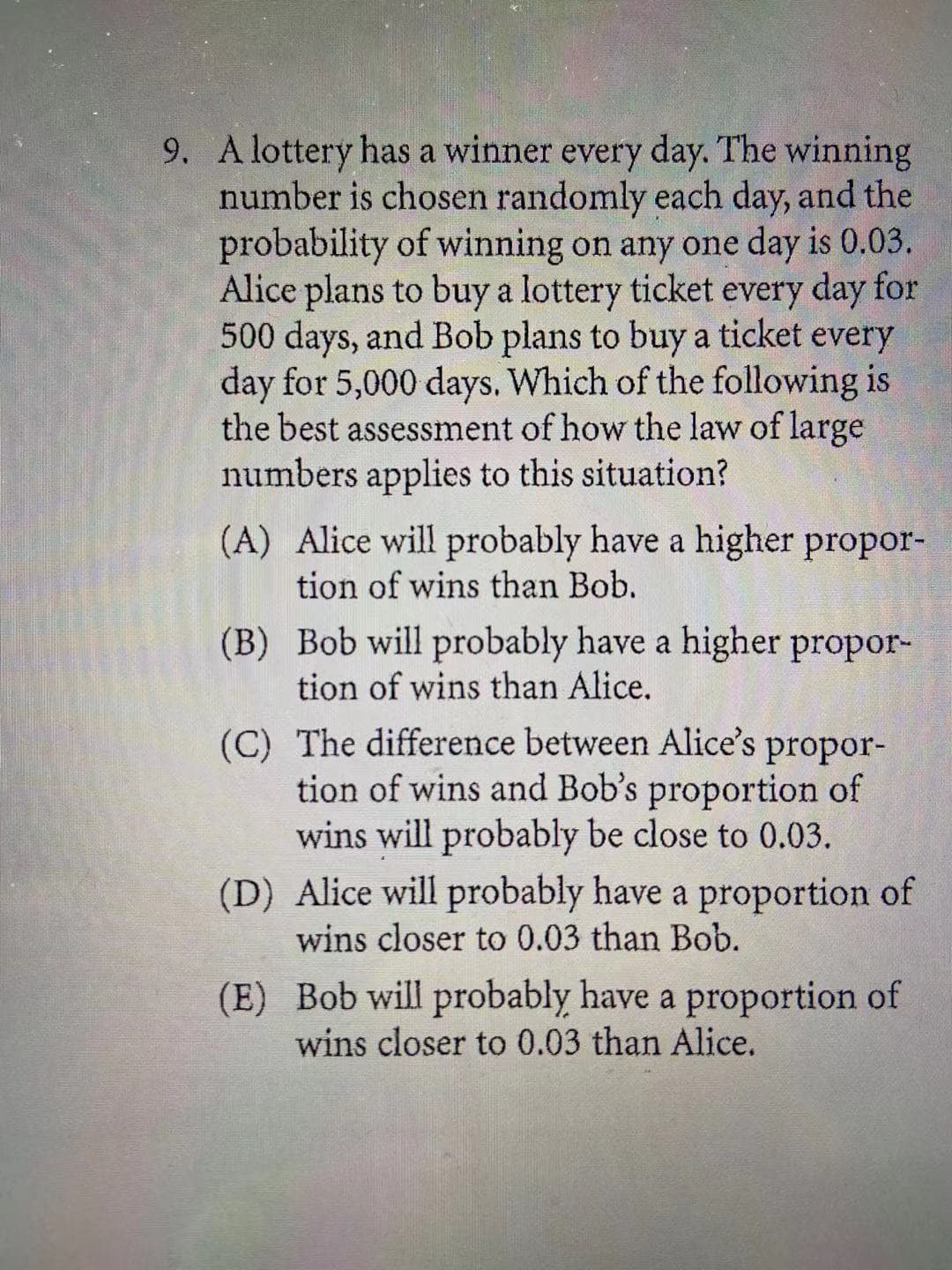9. A lottery has a winner every day. The winning number is chosen randomly each day, and the probability of winning on any one day is 0.03. Alice plans to buy a lottery ticket every day for 500 days, and Bob plans to buy a ticket every day for 5,000 days. Which of the following is the best assessment of how the law of large numbers applies to this situation? (A) Alice will probably have a higher propor- tion of wins than Bob. (B) Bob will probably have a higher propor- tion of wins than Alice. (C) The difference between Alice's propor-
9. A lottery has a winner every day. The winning number is chosen randomly each day, and the probability of winning on any one day is 0.03. Alice plans to buy a lottery ticket every day for 500 days, and Bob plans to buy a ticket every day for 5,000 days. Which of the following is the best assessment of how the law of large numbers applies to this situation? (A) Alice will probably have a higher propor- tion of wins than Bob. (B) Bob will probably have a higher propor- tion of wins than Alice. (C) The difference between Alice's propor-
Algebra and Trigonometry (MindTap Course List)
4th Edition
ISBN:9781305071742
Author:James Stewart, Lothar Redlin, Saleem Watson
Publisher:James Stewart, Lothar Redlin, Saleem Watson
Chapter14: Counting And Probability
Section14.2: Probability
Problem 3E: The conditional probability of E given that F occurs is P(EF)=___________. So in rolling a die the...
Related questions
Question

Transcribed Image Text:9. A lottery has a winner every day. The winning
number is chosen randomly each day, and the
probability of winning on any one day is 0.03.
Alice plans to buy a lottery ticket every day for
500 days, and Bob plans to buy a ticket every
day for 5,000 days. Which of the following is
the best assessment of how the law of large
numbers applies to this situation?
(A) Alice will probably have a higher propor-
tion of wins than Bob.
(B) Bob will probably have a higher propor-
tion of wins than Alice.
(C) The difference between Alice's propor-
tion of wins and Bob's proportion of
wins will probably be close to 0.03.
(D) Alice will probably have a proportion of
wins closer to 0.03 than Bob.
(E) Bob will probably have a proportion of
wins closer to 0.03 than Alice.
Expert Solution
This question has been solved!
Explore an expertly crafted, step-by-step solution for a thorough understanding of key concepts.
This is a popular solution!
Trending now
This is a popular solution!
Step by step
Solved in 2 steps

Knowledge Booster
Learn more about
Need a deep-dive on the concept behind this application? Look no further. Learn more about this topic, statistics and related others by exploring similar questions and additional content below.Recommended textbooks for you

Algebra and Trigonometry (MindTap Course List)
Algebra
ISBN:
9781305071742
Author:
James Stewart, Lothar Redlin, Saleem Watson
Publisher:
Cengage Learning

Algebra & Trigonometry with Analytic Geometry
Algebra
ISBN:
9781133382119
Author:
Swokowski
Publisher:
Cengage

Trigonometry (MindTap Course List)
Trigonometry
ISBN:
9781337278461
Author:
Ron Larson
Publisher:
Cengage Learning

Algebra and Trigonometry (MindTap Course List)
Algebra
ISBN:
9781305071742
Author:
James Stewart, Lothar Redlin, Saleem Watson
Publisher:
Cengage Learning

Algebra & Trigonometry with Analytic Geometry
Algebra
ISBN:
9781133382119
Author:
Swokowski
Publisher:
Cengage

Trigonometry (MindTap Course List)
Trigonometry
ISBN:
9781337278461
Author:
Ron Larson
Publisher:
Cengage Learning